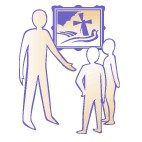|
For the past eight years ACTS has
been actively involved as a major service provider delivering
programs to students in Detroit, Oak Park and Inkster public school
districts through the 21st Century Learning Initiative.
Throughout this process ACTS has provided enrichment instruction in
over 52 Detroit Public Schools alone. The 21st Century
Learning Initiative is a Federally funded program designed to bring
academic assistance and enrichment support activities to students in
the lowest performing schools base upon the No Child Left Behind
initiative.
The various programs facilitated
over the years through this program are: Life Skills, Chess for
Success, Modern Dance, Video Production, Character Development,
Public Speaking, Drama, ReCharge – Health & Nutrition and Sports
Flexibility Training (Baseball, Basketball, Flag Football, and
Soccer).
Why are
afterschool programs good for school-age children and youth?
 Families
across the country are beginning to recognize the tremendous
benefits a quality afterschool program can provide. Because they
offer an array of activities not always available during the
traditional school day, these programs give students many
opportunities for growth and learning they might not find elsewhere.
For example, at a time when many schools have had to cut or reduce
spending on art and music programs, after school programs can offer
kids the opportunity to paint, draw, perform in a dramatic
production, play music, participate in a dance performance, visit
museums, etc. Or students can go into further depth with research
that they may have begun in class time, which is often limited.
While most in the after school field would agree that supporting
academic skills is an important goal for after school programs, they
stress the importance of integrating academic supports into a larger
program that also promotes the social, emotional, and physical
development of the children they serve. In her regular column,
Sandra Feldman, President of the American Federation of Teachers,
recently wrote a "holiday wish list" in which she asked for "more
learning time for children who need it. There is accumulating
research that after school programs, summer school, and extended days
and years enable children who are behind to catch up. And added
academics are not enough. At-risk children need the kind of extras
that advantaged children take for granted but that too many urban
children don't get: sports and cultural activities -- like art,
dancing, visiting museums -- and going on organized excursions." [A
Holiday Wish List by AFT President Sandra Feldman December 2000http://www.aft.org/stand/previous/2000/1200.html] Families
across the country are beginning to recognize the tremendous
benefits a quality afterschool program can provide. Because they
offer an array of activities not always available during the
traditional school day, these programs give students many
opportunities for growth and learning they might not find elsewhere.
For example, at a time when many schools have had to cut or reduce
spending on art and music programs, after school programs can offer
kids the opportunity to paint, draw, perform in a dramatic
production, play music, participate in a dance performance, visit
museums, etc. Or students can go into further depth with research
that they may have begun in class time, which is often limited.
While most in the after school field would agree that supporting
academic skills is an important goal for after school programs, they
stress the importance of integrating academic supports into a larger
program that also promotes the social, emotional, and physical
development of the children they serve. In her regular column,
Sandra Feldman, President of the American Federation of Teachers,
recently wrote a "holiday wish list" in which she asked for "more
learning time for children who need it. There is accumulating
research that after school programs, summer school, and extended days
and years enable children who are behind to catch up. And added
academics are not enough. At-risk children need the kind of extras
that advantaged children take for granted but that too many urban
children don't get: sports and cultural activities -- like art,
dancing, visiting museums -- and going on organized excursions." [A
Holiday Wish List by AFT President Sandra Feldman December 2000http://www.aft.org/stand/previous/2000/1200.html]
There is growing
evidence from around the country that this approach is paying off.
Children and youth who attend after school programs do better in
school, and are safer and less likely to get into trouble in the
hours after the end of the school day. Below is a quick look at what
the available data on after school programs have shown us.
  Afterschool
programs can enhance children's academic achievement. Participants
in afterschool programs: Afterschool
programs can enhance children's academic achievement. Participants
in afterschool programs:
-
show increased interest and
ability in reading
-
develop new skills and interests
-
show improved school attendance,
increased engagement in school, and reduced dropout rate
-
turn in more and better quality
homework and can spend more time on task
-
are held back or placed in special
education classes less frequently
-
are less likely to experience
childhood obesity
-
show shorter times in television
and video game usage
-
show higher aspirations for the
future, including intention to complete high school and go to
college. (See the NIOST fact sheet [http://www.niost.org/]
and Safe and Smart: [http://www.ed.gov/pubs/afterschool/afterschool.pdf])
|